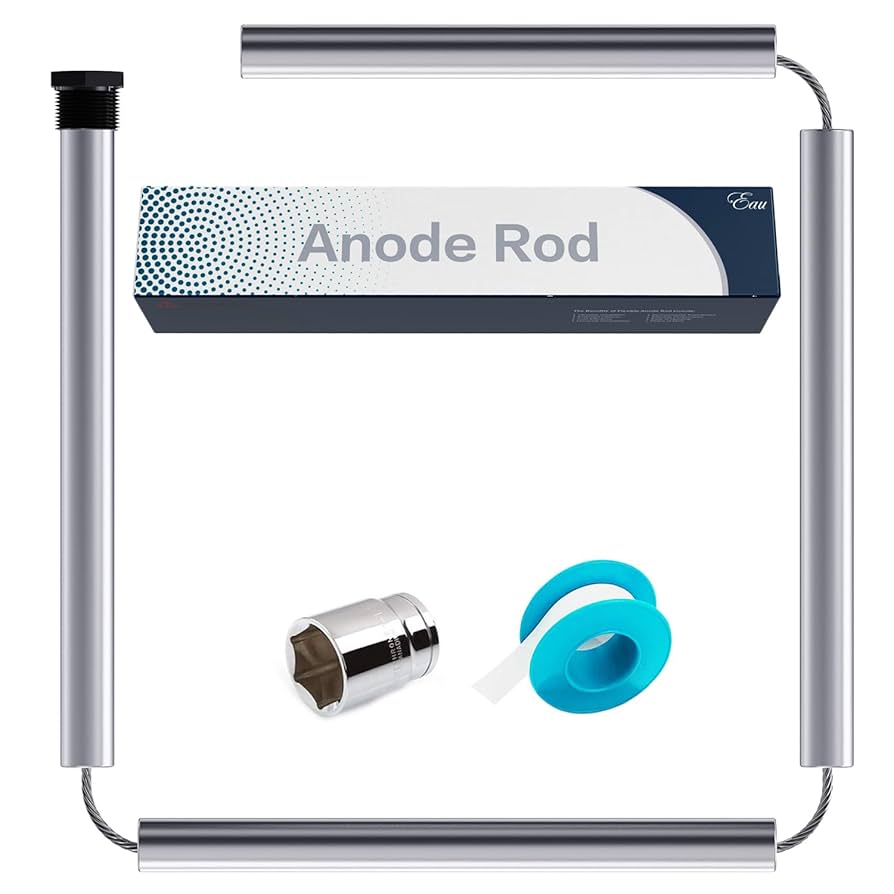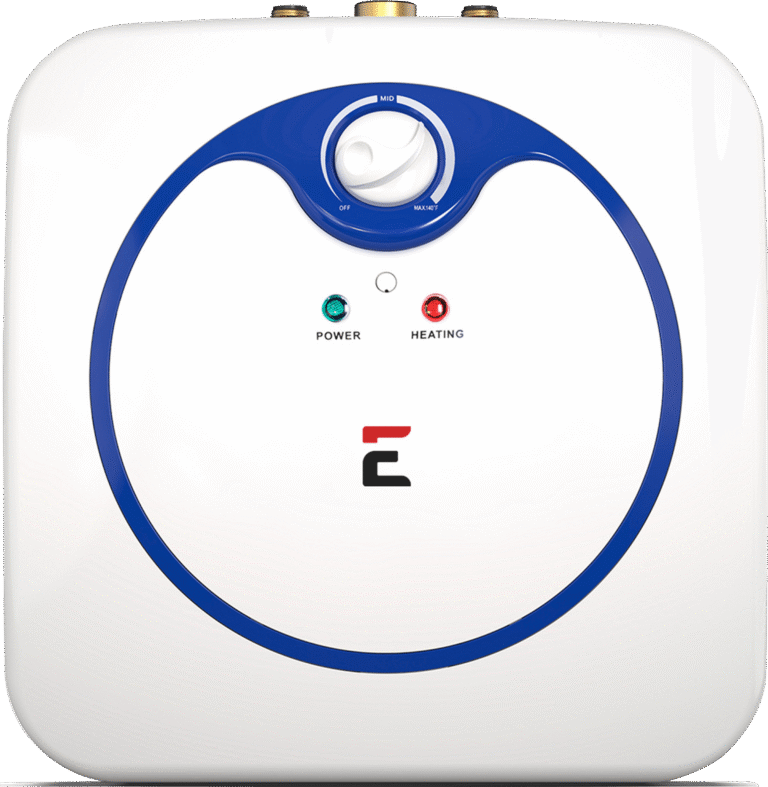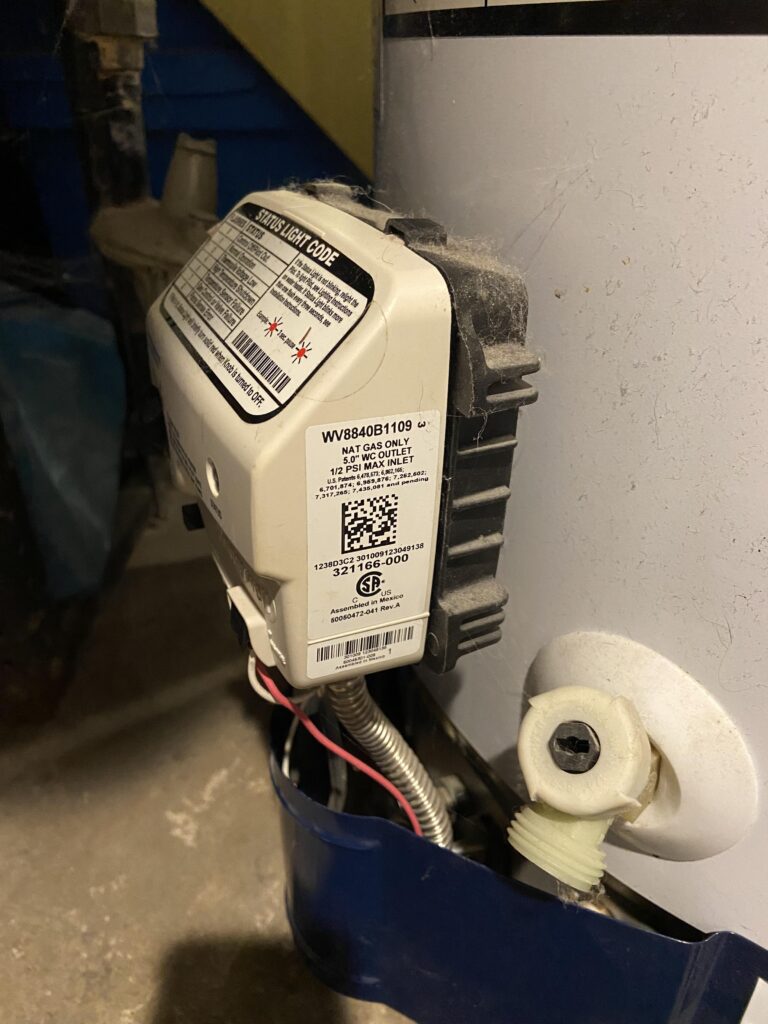Are you stuck trying to decide between a Rheem and a GE water heater? You’re not alone.
Choosing the right water heater is crucial for your home’s comfort and efficiency. But with so many options out there, the decision can feel overwhelming. This article is here to help you make an informed choice. We’ll break down the key features, benefits, and differences between Rheem and GE water heaters.
By the end, you’ll know exactly which one fits your needs best. So, if you’re ready to make a smart investment for your home, keep reading!

Credit: www.amazon.com
Brand Background
When choosing a water heater, understanding the brand’s history can offer valuable insights into their reliability and innovation. Rheem and GE are two prominent names in the industry, each with a unique journey. Let’s delve into their histories to see what they bring to the table.
Rheem History
Founded in 1925, Rheem began as a producer of packaging materials. It wasn’t until later that they ventured into heating systems. This shift marked the beginning of their expansion into water heating solutions.
Rheem is known for prioritizing innovation. They introduced the first automatic gas water heater in the 1930s. This was a game-changer in home comfort, setting a standard for the industry.
Over the decades, Rheem has embraced technological advancements. They focus on energy efficiency and user-friendly designs. Have you ever wondered how technology can transform everyday appliances? Rheem offers a glimpse into this future with their smart water heaters.
Ge History
General Electric, or GE, has roots dating back to the 1800s. Founded by Thomas Edison, GE quickly became a leader in electrical innovation. Their legacy includes everything from light bulbs to power systems.
GE’s venture into water heaters began in the mid-20th century. They leveraged their electrical expertise to design efficient heating solutions. This decision reflected their commitment to creating versatile home appliances.
In recent years, GE has focused on sustainability. Their water heaters are designed to minimize environmental impact. Have you considered how your choice of water heater affects the planet? GE’s eco-friendly models offer a compelling option.
Both Rheem and GE have rich histories that influence their products today. Knowing these backgrounds can help you make an informed choice for your home. What do you prioritize in a brand’s history when choosing appliances?

Credit: www.geappliancesairandwater.com
Types Of Water Heaters
Choosing the right water heater can significantly impact your daily comfort and energy bills. Rheem and GE offer a variety of models, each with unique features. Let’s explore the types of water heaters available, so you can make an informed decision. Whether you’re planning a cozy bath or need hot water on demand, understanding these options will help you find the perfect fit for your home.
Tankless Models
Tankless water heaters are a smart choice if you value efficiency and space-saving designs. These models heat water directly as it flows through the unit. Imagine never running out of hot water during your morning shower!
Rheem’s tankless models boast advanced technology and energy-saving options. GE’s offerings are compact, ideal for homes with limited space. Consider your family’s hot water demands and the layout of your home when deciding between these two.
Traditional Tank Models
Traditional tank water heaters store heated water in a tank, ready for use. They’re typically less expensive upfront and are great for homes with consistent water use.
Rheem provides durable tanks with a variety of sizes, suitable for any household. GE focuses on reliable performance, ensuring your hot water needs are always met. Think about your budget and how often you use hot water before making a choice.
Hybrid Models
Hybrid water heaters combine the best of both worlds. They offer the efficiency of tankless models with the reliability of traditional tanks. If you’re looking for versatility, hybrids are worth considering.
Rheem’s hybrid models integrate smart technology for optimal energy use, while GE’s designs emphasize ease of use and maintenance. Could this be the compromise your home needs? Evaluate the benefits and see which aligns with your lifestyle and energy goals.
Finding the perfect water heater may seem daunting, but with the right information, you can make a choice that suits your needs and preferences. Which type are you leaning towards, and how will it change your daily routine?
Efficiency Ratings
Efficiency ratings matter when choosing a water heater. They determine the energy usage and cost savings over time. Rheem and GE water heaters offer distinct efficiency features. Understanding these can help make an informed decision.
Energy Star Certification
Energy Star certification signifies high efficiency. Rheem models often hold this certification. It ensures reduced energy consumption. GE water heaters also boast Energy Star ratings. These certifications demonstrate commitment to energy conservation.
Performance Metrics
Performance metrics provide insight into heater efficiency. Rheem water heaters often exhibit high Uniform Energy Factor (UEF). This metric reflects the heater’s efficiency in daily operations. GE water heaters also show competitive UEF values. Both brands focus on maximizing energy savings.
Durability And Lifespan
When choosing a water heater, durability and lifespan are crucial factors. A reliable water heater can offer years of uninterrupted service. Rheem and GE both promise durability, but the details matter. Understanding these aspects can help in making an informed decision.
Material Quality
Rheem water heaters are made with strong materials. They often use stainless steel, which resists rust. This enhances their durability. GE water heaters also focus on quality. They use corrosion-resistant materials. This helps prolong their lifespan. Both brands aim to provide long-lasting products.
Warranty Offerings
Rheem provides various warranty options. Their warranties range from six to twelve years. This covers parts and labor, ensuring peace of mind. GE offers similar warranty periods. Their warranty terms often cover parts and tank replacement. A good warranty reflects the manufacturer’s confidence in their product.
Installation And Maintenance
Rheem water heaters are praised for easy installation and reliable maintenance, making them user-friendly. GE water heaters also offer straightforward installation but may require more frequent maintenance checks for optimal performance. Choosing the right model depends on your specific needs and maintenance preferences.
When choosing between Rheem and GE water heaters, understanding the installation and maintenance process is crucial. Both brands offer unique features and benefits, but how easy are they to install, and what kind of maintenance do they require? Let’s dive into these aspects to help you make an informed decision.Ease Of Installation
Installing a water heater can be a daunting task, especially if you’re doing it yourself. Rheem water heaters are known for their user-friendly installation guides. Many users have reported that their step-by-step instructions and labeled parts make the process smoother. On the other hand, GE water heaters also come with clear installation instructions. However, some models may require specific tools or expertise, which could mean you’ll need professional help. Consider your DIY skills before deciding which brand is right for you. Think about the space you have available. Rheem units often come with compact designs, making them suitable for tighter spaces. Meanwhile, GE models might require a bit more room, so measure your space carefully.Maintenance Requirements
Once installed, keeping your water heater in top shape is vital for longevity. Rheem heaters generally require minimal maintenance. Regular check-ups, such as flushing the tank annually and checking the anode rod, are usually sufficient. GE water heaters might demand a bit more attention. Some models have advanced features that require specific maintenance steps. This might include checking electronic components or cleaning air intake screens. Ask yourself if you’re comfortable with regular maintenance tasks. If not, you might want to consider how much professional servicing could add to the overall cost. In essence, both Rheem and GE water heaters have their installation and maintenance upsides. Your choice could depend on how much effort you’re willing to invest in the setup and upkeep. Would you prefer a hands-on approach, or is professional assistance a better fit for your lifestyle?Cost Comparison
Choosing the right water heater can feel like a financial balancing act. You’re not just comparing the initial cost but also weighing long-term expenses. Rheem and GE are popular choices, each with their own cost implications. Let’s dive into a detailed cost comparison to help you make an informed decision.
Initial Purchase Price
When you first look at Rheem and GE water heaters, the sticker price might sway your decision. Rheem models tend to be slightly cheaper upfront, offering a variety of options to fit different budgets. A friend of mine recently opted for a Rheem model because its lower initial cost fit her budget perfectly.
GE, on the other hand, often has a higher starting price. This can be attributed to their advanced features and energy-efficient models. If you’re leaning towards GE, ask yourself if those features justify the extra cost for your specific needs.
Long-term Operating Costs
Initial cost is just one side of the coin. Long-term operating costs can truly impact your wallet over time. Rheem water heaters are known for their efficiency, which can lead to savings on energy bills. It’s like buying a car with great mileage; you save more in the long run.
GE models, while potentially pricier upfront, often boast even higher energy efficiency ratings. This means that, although you’re paying more initially, you might save significantly on electricity or gas bills. Consider the lifespan of the heater and calculate potential savings.
Have you ever thought about the total cost of ownership? It’s crucial to look beyond the initial price and consider your monthly expenses. Calculate the annual energy consumption and see which model aligns with your financial goals. Can a higher upfront cost lead to savings down the road?
Ultimately, your choice may depend on your immediate budget and how much you value long-term savings. Do you prefer a smaller initial investment or are you willing to pay more upfront for greater efficiency? Weigh these factors carefully to find the best fit for your home.
User Reviews And Feedback
Choosing between Rheem and GE water heaters can be challenging. User reviews help make informed decisions. These reviews offer insights into real experiences. They highlight satisfaction levels and common concerns. Let’s delve deeper into these user perspectives.
Customer Satisfaction
Rheem users often praise reliability. Many find their heaters long-lasting. Installation is easy according to several reviews. Some users appreciate the energy efficiency of Rheem models. Feedback shows a high level of satisfaction.
GE water heaters receive good reviews for affordability. Customers are happy with their performance. Many users mention the quiet operation. They also appreciate the sleek design. Overall, GE heaters have a positive reputation.
Common Complaints
Rheem heaters occasionally face issues. A few users mention leakage problems. Others express concerns about warranty service. Some find the customer support slow.
GE heaters have their drawbacks. Some users complain about heating speed. A few mention maintenance challenges. Others have experienced short lifespan issues. Both brands face some common complaints. But many users still trust their choice.
Environmental Impact
Choosing between Rheem and GE water heaters affects the environment differently. Rheem often emphasizes energy efficiency, reducing carbon footprints. GE focuses on recyclable materials, aiming for sustainable production. Understanding these impacts helps make eco-friendly decisions.
The environmental impact of water heaters is a growing concern, especially as more people become conscious of their ecological footprint. Rheem and GE, two prominent brands in the water heater market, offer products with varying degrees of environmental friendliness. Understanding how each company addresses eco-friendliness, recycling, and disposal can help you make an informed decision that aligns with your values.Eco-friendly Features
Both Rheem and GE are making strides to improve the eco-friendliness of their water heaters. Rheem offers models with high energy efficiency ratings, which can significantly reduce your home’s overall energy consumption. Some models even feature hybrid technology, combining heat pump efficiency with traditional heating elements. GE also emphasizes energy efficiency, with many of its units carrying the Energy Star label. This certification ensures that the product meets strict guidelines for energy savings. If you’re concerned about reducing your carbon footprint, these features can make a significant difference. Have you ever considered how much energy your water heater uses daily? Choosing a model with these eco-friendly features might be a small step, but it makes a big impact over time.Recycling And Disposal
Recycling and disposal are critical when it comes to the environmental impact of water heaters. Rheem offers a program to help you recycle your old water heater, reducing landfill waste. This initiative supports a circular economy and helps conserve natural resources. GE also provides guidance on how to properly dispose of their water heaters. They encourage consumers to contact local recycling centers to handle old units responsibly. Proper disposal ensures that hazardous materials are managed correctly, preventing environmental harm. Have you ever faced the dilemma of disposing of a bulky appliance? Knowing that these companies offer sustainable options can ease your concerns and encourage responsible choices. By focusing on eco-friendly features and responsible disposal, both Rheem and GE are making positive contributions to the environment. As you consider your next water heater, think about the impact your choice will have. Are you ready to make a change for a greener future?
Credit: www.amazon.com
Frequently Asked Questions
Are Rheem And Ge Water Heaters The Same?
Rheem and GE water heaters are not the same. Rheem manufactures its own water heaters. GE water heaters were previously produced by Rheem, but GE now licenses its brand to other manufacturers. Always verify the brand and manufacturer when purchasing.
What Is The Most Reliable Brand Of Water Heater?
Rheem is widely considered a reliable water heater brand. It offers durable, efficient models with innovative features. Many homeowners trust Rheem for its long-lasting performance and energy efficiency. Other reputable brands include A. O. Smith, Bradford White, and Bosch. Always choose a brand based on specific needs and customer reviews.
When Did Ge Stop Making Water Heaters?
GE stopped making water heaters in 2016. They sold their appliance division to Haier Group. Now, Haier handles production and distribution. GE Appliances continues to offer support for existing products. Customers should contact Haier for any new water heater needs.
What Is The Most Common Problem With Rheem Water Heaters?
The most common problem with Rheem water heaters is heating issues. These can result from faulty thermostats or heating elements. Regular maintenance and timely inspections can help prevent such problems. Ensure proper installation and check electrical connections for optimal performance and longevity.
Conclusion
Choosing between Rheem and GE water heaters depends on your needs. Both brands offer reliable performance. Rheem is known for advanced technology. GE provides dependable and straightforward options. Consider energy efficiency, size, and budget. Think about warranty and support too.
Read user reviews for real-life experiences. Each brand has its strengths. Evaluate what matters most to you. Make a choice that fits your home perfectly. A well-informed decision ensures comfort and peace of mind.



